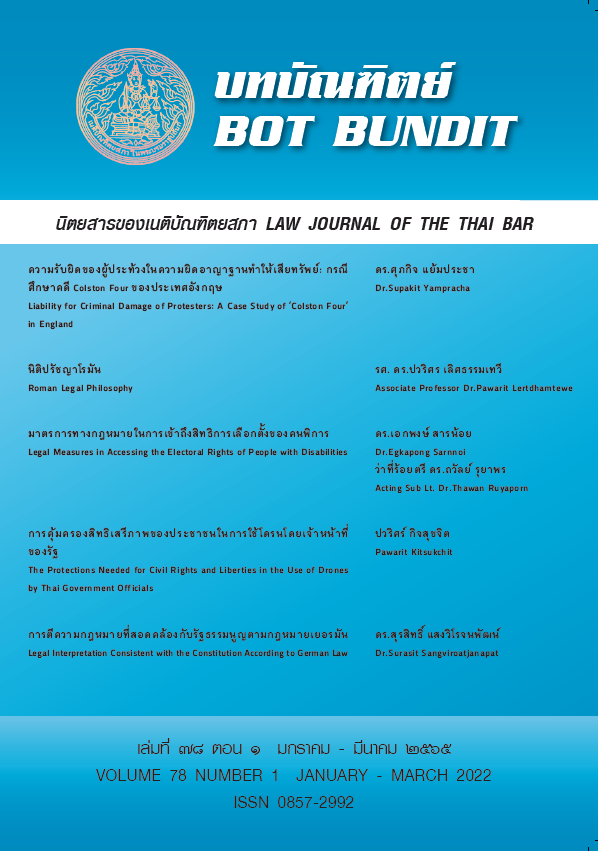ความรับผิดของผู้ประท้วงในความผิดอาญาฐานทำให้เสียทรัพย์: กรณีศึกษาคดี Colston Four ของประเทศอังกฤษ
Main Article Content
บทคัดย่อ
การประท้วงและการชุมนุมเรียกร้องต่อรัฐบาลหรือหน่วยงานของรัฐเป็นสิ่งปกติในสังคมประชาธิปไตย อย่างไรก็ดีในการประท้วงอาจมีการทำให้เสียหายหรือทำลายทรัพย์สินของบุคคลอื่น อันนำไปสู่การถูกดำเนินคดีฐานทำให้เสียทรัพย์ ซึ่งมีข้อพิจารณาว่าการทำให้เสียทรัพย์ในบริบทของการประท้วงนั้นจะมีเหตุยกเว้นความรับผิดตามกฎหมายอย่างไรหรือไม่ บทความนี้วิเคราะห์ข้อต่อสู้ ของจำเลยในคดีของศาลอังกฤษที่มีคำตัดสินเมื่อต้นปี พ.ศ. ๒๕๖๕ ที่รู้จักกันอย่างกว้างขวาง ในชื่อคดี Colston Four ซึ่งมีการตัดสินว่าผู้ประท้วงไม่ต้องรับผิดฐานทำให้เสียทรัพย์ อันนำมาสู่การวิพากษ์วิจารณ์อย่างกว้างขวางในวงการกฎหมายของประเทศอังกฤษ ผลการวิเคราะห์เปรียบเทียบ กับกฎหมายไทยได้ข้อสรุปในเบื้องต้นว่าหากคดีนี้เกิดขึ้นในประเทศไทย จำเลยในคดีอาจไม่สามารถอ้างข้อต่อสู้เดียวกันมายกเว้นความรับผิดได้
Article Details

อนุญาตภายใต้เงื่อนไข Creative Commons Attribution-NonCommercial-NoDerivatives 4.0 International License.
เอกสารอ้างอิง
ภาษาไทย
หนังสือ
เกียรติขจร วัจนะสวัสดิ์. (๒๕๖๒). คำอธิบายกฎหมายอาญา ภาค ๑ เล่ม ๑ พิมพ์ครั้งที่ ๑๑. กรุงเทพมหานคร: กรุงสยาม พับลิชชิ่ง.
คณพล จันทน์หอม. (๒๕๖๓). คำอธิบายกฎหมายอาญาภาคความผิด เล่ม ๓ พิมพ์ครั้งที่ ๕. กรุงเทพมหานคร: วิญญูชน.
ทวีเกียรติ มีนะกนิษฐ. (๒๕๖๔). คำอธิบายกฎหมายอาญา มาตรา ๒๘๘-๓๖๖/๔. กรุงเทพมหานคร: วิญญูชน.
ภาษาอังกฤษ
หนังสือ
Ashton, C. et al. (2003). Fundamentals of Scots Law. Edinburgh: W.Green & Son.
Ferguson, P.R. & McDiarmid, C. (2009). Scots Criminal Law: A Critical Analysis. Dundee: Dundee University Press.
Finch, E. & Fafinski, S. (2019). Criminal Law 7th edition. Harlow: Pearson Education Limited.
Jones, T.H. & Christie, M.G.A. (1996). Criminal Law 2nd edition. Edinburgh: W.Green/ Sweet&Maxwell.
Padfield, N. (2005). Criminal Law 4th edition. Oxford: Oxford University Press.
สารสนเทศอิเล็กทรอนิกส์
BBC News. (2022, January 25). Colston Four Trial: Attorney General defends ‘considering’ referring acquittal. Retrieved from https://www.bbc.com/news/uk-england-bristol-60133938.
Hare, I. (2022). The Colston Four should never have been charged with criminal damage. Retrieved from https://www.apollo-magazine.com/colston-statue-trial-not-guilty-criminal-damage/.
Hayes, G. Doherty, B. and Cammiss, S. (2022). We attended the trial of the Colston four: here’s why their acquittal should be celebrated. Retrieved from https://theconversation.com/we-attended-the-trial-of-the-Colston-four-heres-why-their-acquittal-should-be-celebrated-174481.
Lykourhou, K. (2022). The acquittal of the Colston protesters and the implications for future cases. Retrieved from https://insights.doughtystreet.co.uk/post/102hfvf/the-acquittal-of-the-Colston-protesters-and-the-implications-for-future-cases.
Siddique, H. (2022). Jurors see the bigger picture: activists who were cleared in court. Retrieved from https://www.theguardian.com/world/2022/jan/06/jurors-see-the-bigger-picture-activists-who-were-cleared-in-court.


